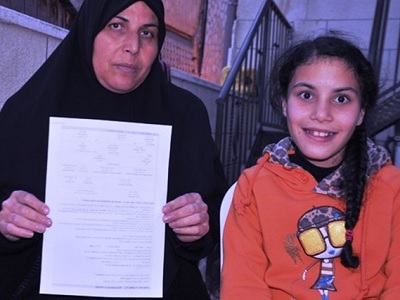
By Mahmoud Zidan
At the beginning of the New Year, I cannot help but remember Hadeel Rajabi, an eleven-year-old child. Do I need to say that she’s like all children at this age, full of a combination of innocence, ambition, stubbornness, and perhaps mischievousness? Yes, I do, as she’s a Palestinian. As a result of her “identity,” she’s forced to take a different, much more winding course, with no certainty whatsoever as to how that course will look like in the future.
On Wednesday the 18th of January last year, Hadeel was not given a gift nor was she expecting one. She wasn’t rewarded for being a high-achieving student, either. She was reminded that she’s a Palestinian, as she was summoned to the Qishla police station in the western part of the Old City of Jerusalem.
And this is how she ended the previous year: not with candy but with cross-examination. She was reminded that her childhood and concomitant innocence do not matter and that she’s a Palestinian first and foremost–her age being irrelevant.
Almost six months earlier, she wasn’t allowed to enter Al-Aqsa Mosque compound. That was the 26th of April, 2015; the Israeli colonial army “blacklisted” her. Prior to that, they had banned her mother from entering the compound.
At such a formative stage in her life, Hadeel must have lots of questions in mind that she’s inherited from 2015: Why me? Why my family? Why my people? Hadeel might not know the answers to all those questions, but she’s definitely thinking of some answers. One would think that one of those answers is that there’s no hope, as the previous year would be similar to this year.
On the contrary, that experience made her all the more determined after the interrogation. According to Al Araby Al Jadeed, she emphatically said, “Al Aqsa compound is ours, and they can’t prevent us from entering it.” She said that emphatic statement despite the injuries that an Israeli soldier has inflicted on her and that she still remembers. Etched in the mind of this child is immunity against oblivion.
Hadeel’s story is just one among too many. According to the Defense for Children Int. (DCI)-Palestine, the Israeli army killed almost 2000 between 2000 and 2015, detained an average of 250 children between the ages 12 and 17, demolished many houses where children used to live, and even–the word “even” is superfluous here–used children as human shields (debunking the Israeli myth).
On top of all that, the Israeli army constantly deprives Palestinian children of the right to education through consistently exposing them to checkpoints and school closures. According to the Monthly Humanitarian Bulletin of November 2015 that was published by the UNOCHA in Occupied Palestinian Territories, there are “4,200 children in Hebron city who must cross at least one military checkpoint and undergo inspections and searches to reach their schools.”
This abominable state led the Monitoring and Reporting Mechanism under the Children and Armed Conflict Office to publish a letter that was addressed to the Security Council by the Secretary General, on June 5 2015, urging Israel “to take concrete and immediate steps” to protect Palestinian children.
But focusing on children should not distract us from the larger picture. More often than not, we tend to forget about those children’s parents and extended families. By so doing, we ignore the concrete conditions that all Palestinians, regardless of age or sex, have to experience, conditions that prevent them from forgetting even if they want to.
Although Israel is very invested in erasing any form of Palestinian life and making Palestinians forget, it consistently keeps reminding them of their harsh realities. While Israel claims that it’s embattled and beset by people who seek its destruction, it is actually embattling itself; it is a self-destructive machine. I am reminded of Kafka, a Jewish writer, who wrote a story entitled “In the Penal Colony” about a torture machine, a machine which ends up killing the torturer. Israel is monomaniacally going in that direction, and its policies will definitely backfire.
But regardless of whether Israel makes its colonialism more and more visible or not, Palestinians—young, old, female, and male—will continue to remember, and one day the new year will be a happy new year for them, but Israel is adamant about hastening that day.
– Professer Mahmoud Zidan lives in Jordan. He contributed this article PalestineChronicle.com.




